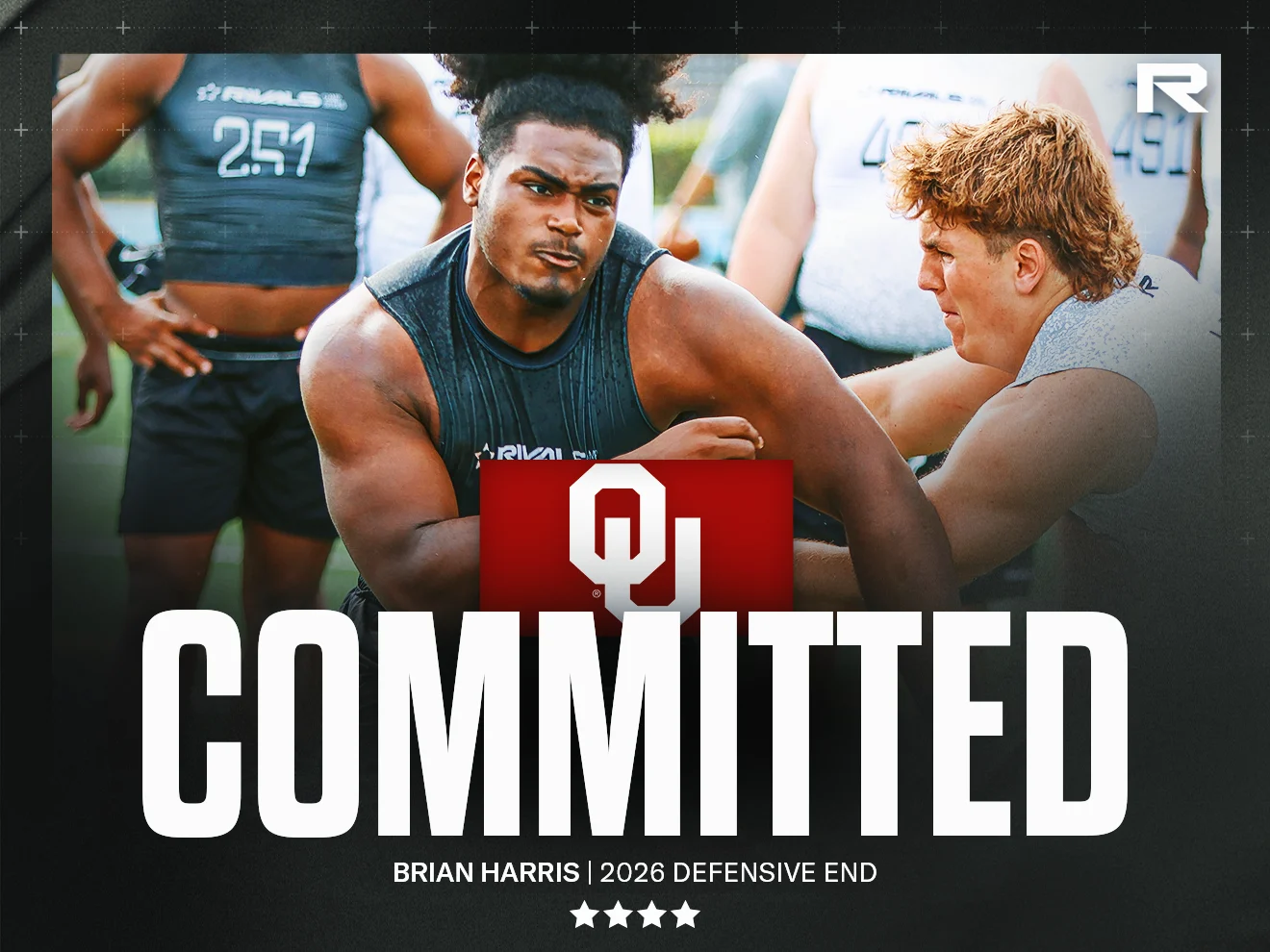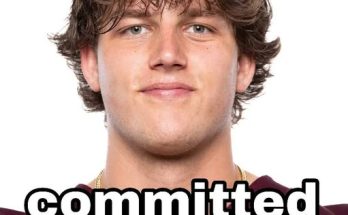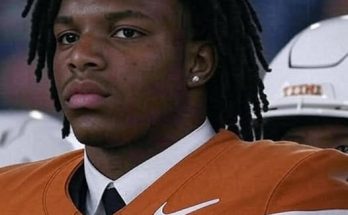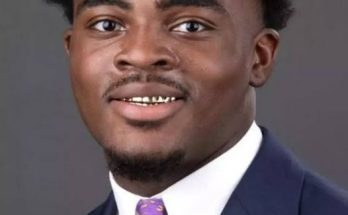In a recruiting win that reverberated across the college football landscape, the Oklahoma Sooners have secured a commitment from one of the most coveted defensive prospects in the nation—Brian Harris, a blue-chip defensive lineman with the talent, frame, and motor to become a cornerstone of Brent Venables’ resurgent defense. Harris, a 6-foot-5, 285-pound force of nature from Houston, Texas, made his decision public on Monday, sending a wave of excitement through Norman and delivering another recruiting statement from a program determined to return to national prominence.
Harris had been courted by virtually every elite college football power in America, including Georgia, Alabama, Texas, and LSU. His recruitment has been a headline-grabber for months, with national analysts and regional insiders speculating about which program would ultimately win out for his signature. But in the end, it was the Sooners’ culture, coaching staff, and vision for the future that sealed the deal.
For Oklahoma, this commitment is more than just a win on the trail—it’s a symbolic shift. Under Venables, the Sooners have made a concerted effort to beef up the trenches, particularly on defense, where dominance at the line of scrimmage has long been a hallmark of championship-caliber teams. Harris fits that mold perfectly. He’s the type of defensive lineman who can disrupt a game plan on his own, combining elite athleticism with refined technique and a relentless drive.
The addition of Harris continues an encouraging trend for Oklahoma. Since Venables took over the reins in Norman, the Sooners have prioritized recruiting elite defensive talent—something that had been an area of concern in the latter years of the Lincoln Riley era. While Riley’s offenses dazzled and dominated, the defense often lagged behind. Venables, a defensive mastermind who helped build Clemson into a powerhouse on that side of the ball, has made no secret about his intentions: to field a defense that can win national championships.
Harris gives Oklahoma exactly the kind of impact player it needs to make that vision a reality. Scouts rave about his explosive first step, violent hands, and rare ability to collapse the pocket. He’s not just a pass-rusher, either. His run-stopping instincts and ability to shed blockers in pursuit make him a three-down player from Day One. With a ceiling that could take him all the way to the NFL, Harris is seen as a foundational piece for the Sooners’ defensive front.
What makes Harris’ commitment even more significant is the fact that Oklahoma beat out not only traditional SEC powerhouses, but also their biggest in-state rival: the Texas Longhorns. The Red River rivalry has always extended to the recruiting trail, and landing a player of Harris’ caliber out of the heart of Texas sends a strong message. The Sooners are not backing down from anyone—geographically, competitively, or stylistically.
Harris’ decision did not come easily. The recruiting process saw him take multiple visits, including official stops in Athens, Tuscaloosa, Austin, and Norman. While each school had its own appeal—Georgia’s recent national titles, Alabama’s championship pedigree, Texas’ proximity to home—it was Oklahoma that stood out the most to Harris and his family. According to sources close to the recruitment, it was the personal connection he developed with Venables and defensive line coach Todd Bates that made the ultimate difference.
Harris was reportedly impressed by how Oklahoma’s coaching staff took the time to understand him as a person, not just as a football player. During visits to Norman, the Sooners emphasized player development, both on and off the field. Harris has expressed a strong desire to grow not just into an elite athlete, but into a leader and role model. Oklahoma presented a plan that addressed every aspect of that vision.
Moreover, Venables’ track record of developing elite defensive linemen carried serious weight. From his time at Clemson, where he coached first-round picks like Christian Wilkins, Dexter Lawrence, and Clelin Ferrell, Venables has proven he can mold raw talent into NFL-ready monsters. Harris sees himself as the next in that lineage.
In interviews leading up to his decision, Harris spoke often about culture, work ethic, and legacy. He’s not the type of recruit who is chasing headlines or looking for the flashiest offer. His commitment to Oklahoma feels like a perfect match for what the Sooners are building—gritty, driven, and focused on championships.
The buzz surrounding Harris’ pledge was immediate. Social media lit up with reaction from fans, former players, and national analysts. ESPN’s Tom Luginbill called the commitment a “game-changer for Oklahoma’s defensive future,” while 247Sports recruiting analyst Steve Wiltfong noted that Harris could be “a program-defining player who changes the way Oklahoma recruits in the trenches moving forward.”
Indeed, the ripple effects could be far-reaching. Landing a recruit like Harris gives Oklahoma momentum with other top-tier prospects, particularly in the Southeast and Texas, where the Sooners are actively battling SEC programs for elite talent. It also reinforces to fans and stakeholders that Venables has Oklahoma on a trajectory toward competing for a national title once again.
Oklahoma’s upcoming transition into the SEC adds even more significance to Harris’ commitment. As the Sooners prepare to enter college football’s most unforgiving conference, bolstering the defensive front is an absolute necessity. Harris represents the type of player who can go toe-to-toe with the elite offensive lines in the SEC—whether it’s LSU, Alabama, Georgia, or Florida.
His commitment also adds depth and versatility to a defensive line that is rapidly improving. Oklahoma has done well in recent cycles to stockpile talent at the position, but Harris brings a different level of upside. His presence will not only raise the standard in the locker room, but also push his teammates to elevate their game. Competition breeds excellence, and Harris’ arrival ensures that Oklahoma’s D-line room will be as competitive as any in the country.
In terms of on-field projection, Harris is expected to slot into a starting role early in his career. Whether it’s as a 3-technique in a four-man front or a strong-side end in odd looks, his flexibility makes him a scheme-versatile weapon. Defensive coordinators love players who can wear multiple hats, and Harris checks every box.
But perhaps what’s most impressive about Harris isn’t just the athleticism, the frame, or the accolades—it’s the maturity. Coaches describe him as “all business,” a player who studies film relentlessly, asks detailed questions in meetings, and takes pride in doing things the right way. In an era where some blue-chip prospects can coast on talent, Harris is the opposite. He’s a grinder, and that mentality aligns perfectly with what Venables preaches.
There’s still a long way to go before Harris steps onto Owen Field in a Sooner uniform, but his commitment marks a defining moment for the 2025 class. Oklahoma now has a centerpiece to build around—a defensive anchor who can change the complexion of games and become a face of the program.
The road to national contention is paved with elite talent, and Brian Harris is as elite as they come. His decision to choose Oklahoma speaks volumes about where the Sooners are headed and the type of program Brent Venables is assembling. For a fan base hungry for a return to greatness, this commitment offers more than just hope—it offers proof.
In the ever-competitive world of college football recruiting, landing a player like Brian Harris doesn’t just add a name to the roster. It shifts the perception of what’s possible. It tells the rest of the country that Oklahoma isn’t just talking about building an elite defense—it’s doing it. And with Harris now in the fold, the Sooners have taken one massive step closer to becoming the kind of team that can not only compete in the SEC but dominate it.



